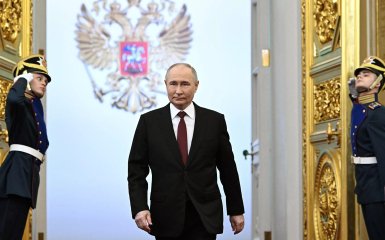Western analysts in the material of The Wall Street Journal note that after the Kremlin dictator Vladimir Putin begins a new term in power in Russia, he will strengthen his own capabilities to conduct against Ukraine and Western countries.
What to expect from Putin's new term as head of Russia
Analysts say that after the start of a new six-year term as the head of the Kremlin, dictator Vladimir Putin will be directly focused on continuing the criminal war against Ukraine and finding allies to strengthen alliances that oppose Western countries.
The publication notes that Russia currently has no closer ally than China.
It is noted that the interests of these countries will be expected at least for the next few months and years.
We were and will be open to strengthening good relations with all countries that see Russia as a reliable and honest partner. And this is truly the world's majority. We do not refuse dialogue with Western countries. The choice is theirs: whether they intend to continue attempts to restrain the development of Russia, to continue the policy of aggression, continuous pressure on our country for years, or to look for a way to cooperation and peace, the journalists of the publication quoted Putin's statement during the so-called inauguration in one of the Kremlin's halls.
The authors of the material conclude that the Kremlin dictator values allied relations with China above all else.
In particular, China played a key role in supporting Russia at the beginning of the Russian army's criminal invasion of Ukraine, granting Russian oil vessels access to its ports.
Even though China officially denies the supply of weapons and ammunition to Russia, Chinese companies supply the aggressor country with goods of dual value, electronics and other components for the manufacture of weapons and missiles.
China is a lifeline for Russia, says Leon Aron, a senior researcher at the American Enterprise Institute.
Who else will Putin look for as allies
However, Putin also maintains close ties with Iran and North Korea.
In addition to drones, Iran may soon send ballistic missiles to Moscow.
After North Korea provided the Russian Federation with material assets, the Russians blocked the UN from monitoring international sanctions against Pyongyang. They questioned their value and proposed imposing time limits on them.
What you have are these four countries that really form an axis. It's a comfortable partnership, and it currently serves Moscow's interests to keep them more or less together despite their differences, said Donald Jensen, senior adviser on Russia and Europe at the US Institute of Peace in Washington.
Putin also plans to hold talks with the leaders of Cuba, Laos, and Guinea-Bissau after the inauguration, which is further evidence of his focus on deepening Russia's foreign relations.
Putin can afford to focus almost all of his attention on the war and these external alliances, since there is very little in the way of domestic opposition. The escalation of the wave of repression silenced almost all of his critics. The most famous of them, Alexei Navalny, died in February in the Arctic colony under circumstances that are still unclear. Others fled into exile or, like Vladimir Kara-Murza, are serving long prison terms, the publication says.
Expectations are growing that reshuffles in the Russian cabinet will lead to the resignation of some prominent figures.
In the long term, Putin will likely focus on maintaining and building relationships that have put Russia on the verge of achieving a decisive advantage in the war.
Putin will spend most of his time thinking about war, including thinking about foreign relations, because Russia is unable to economically dominate the entire West on its own, predicts Syracuse University political science professor Brian Taylor.




